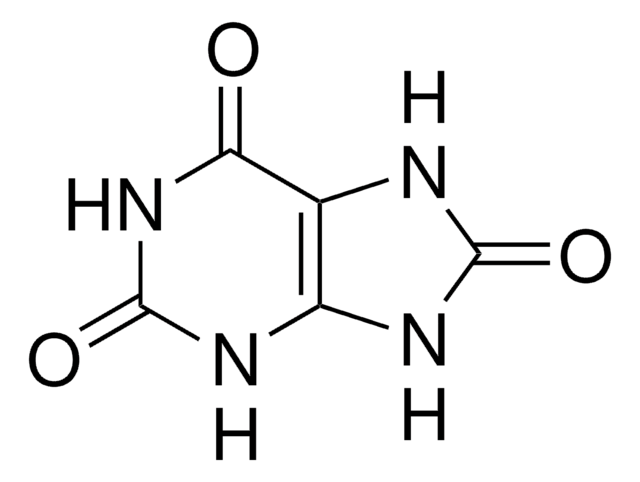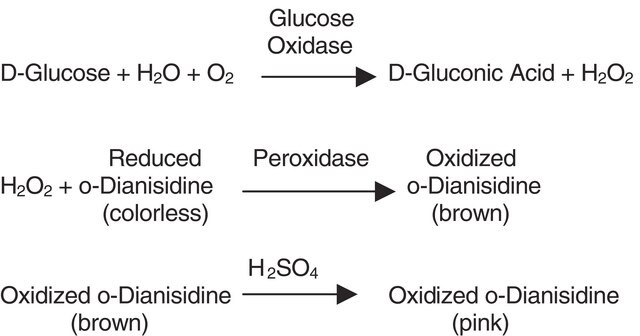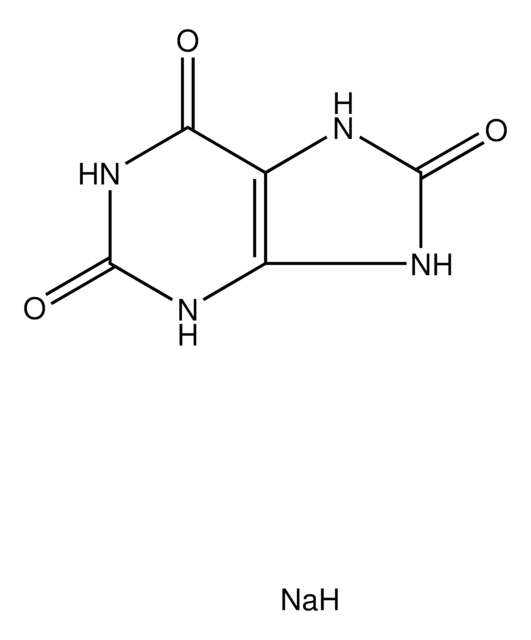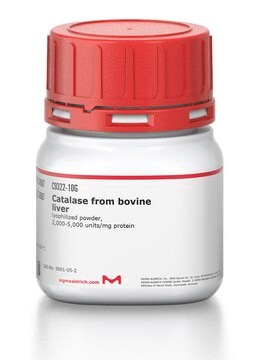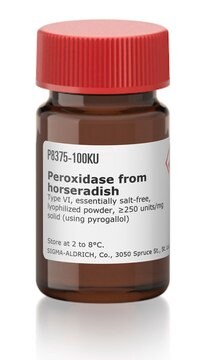U0880
Uricase from Candida sp.
recombinant, expressed in E. coli, lyophilized powder, ≥2 units/mg solid
Synonym(s):
Urate: oxygen oxoreductase
Sign Into View Organizational & Contract Pricing
All Photos(2)
About This Item
Recommended Products
recombinant
expressed in E. coli
Quality Level
form
lyophilized powder
specific activity
≥2 units/mg solid
mol wt
35 kDa by SDS-PAGE
storage temp.
−20°C
InChI
1S/C18H23N4O14P.H3N/c23-5-7-14(13(28)16(34-7)22-4-2-10(25)20-18(22)30)36-37(31,32)33-6-8-11(26)12(27)15(35-8)21-3-1-9(24)19-17(21)29;/h1-4,7-8,11-16,23,26-28H,5-6H2,(H,31,32)(H,19,24,29)(H,20,25,30);1H3
InChI key
VPXDHZMLJOJKOX-UHFFFAOYSA-N
General description
Uricase deficient mice develop uric acid nephropathy and diabetes insipidus which can be mitigated with recombinant uricase treatment.
Uricase is a homo-tetrameric protein with its active sites at the head-to-tail monomer-dimer interface.
Application
Uricase from Candida sp. has been used:
- to eliminate urate in plasma samples and evaluate the contribution of urate to the total plasma antioxidant capacity
- to intraperitoneally inject the mice to study the role of uric acid in fibrin extracellular traps (ET) formation
- for elimination of uric acid in ferric reducing/antioxidative power (FRAP) assay to measure the total antioxidative capacity of human plasma sample; in uricase-based biosensors
Biochem/physiol Actions
Uricase participates in purine catabolism. It catalyzes the conversion of highly insoluble uric acid into 5-hydroxyisourate. Accumulation of uric acid causes liver/kidney damage or chronically causes gout. In mice, a mutation in the gene encoding uricase causes a sudden increase in uric acid. Mice, deficient in this gene, exhibit hyperuricemia, hyperuricosuria, and uric acid crystalline obstructive nephropathy.
Unit Definition
One unit will oxidize 1.0 μmole of uric acid to allantoin per minute at pH 8.5 at 25 °C.
Physical form
Powder; contains citrate and sucrose
Storage Class Code
11 - Combustible Solids
WGK
WGK 3
Flash Point(F)
Not applicable
Flash Point(C)
Not applicable
Choose from one of the most recent versions:
Already Own This Product?
Find documentation for the products that you have recently purchased in the Document Library.
Customers Also Viewed
Rocco Cancelliere et al.
Biosensors, 12(1) (2022-01-21)
The use of carbon nanomaterials (CNMs) in sensors and biosensor realization is one of the hottest topics today in analytical chemistry. In this work, a comparative in-depth study, exploiting different nanomaterial (MWNT-CO2H, -NH2, -OH and GNP) modified screen-printed electrodes (SPEs)
Darko Duplancic et al.
Molecules (Basel, Switzerland), 16(8), 7058-7068 (2011-08-19)
Determination of the relative contribution of uric acid level increases to the total measured antioxidative activity could be very useful for testing antioxidative products and their effect on human health. The aim of this report is to present a simple
S J Kelly et al.
Journal of the American Society of Nephrology : JASN, 12(5), 1001-1009 (2001-04-24)
Uricase-deficient mice develop uric acid nephropathy, with high mortality rates before weaning. Urate excretion was quantitated and renal function was better defined in this study, to facilitate the use of these mice as a model for evaluating poly(ethylene glycol)-modified recombinant
Patrizia Zaramella et al.
Pediatrics, 131(1), e309-e312 (2012-12-05)
This case report describes a preterm newborn infant who was treated with a single dose of rasburicase for an increase in uric acid level. He died on the third day as a result of complications of hemolysis, which appeared to
Sara Cipriani et al.
Journal of neurochemistry, 123(1), 172-181 (2012-06-08)
Urate is the end product of purine metabolism and a major antioxidant circulating in humans. Recent data link higher levels of urate with a reduced risk of developing Parkinson's disease and with a slower rate of its progression. In this
Our team of scientists has experience in all areas of research including Life Science, Material Science, Chemical Synthesis, Chromatography, Analytical and many others.
Contact Technical Service

